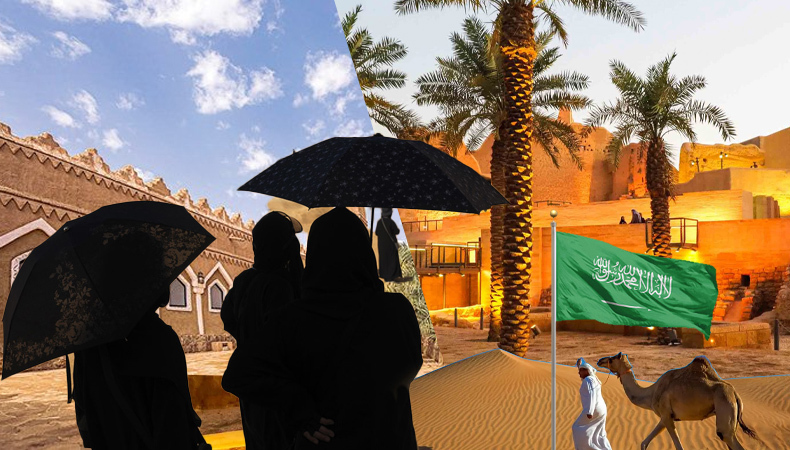Things to know before visiting Saudi Arabia

Saudi Arabia is now easier than ever for Australians to visit thanks to the removal of coronavirus restrictions, one of the world’s easiest e-visa systems, and a constantly growing tourism infrastructure. But how does going actually feel? Sarah Reid, a travel writer, learns more.
I’ve visited the Kingdom twice since tourist visas were first introduced in 2019 out of curiosity to learn more about the ancient history, contemporary culture, and natural beauties of this shrouded nation and because I believe that tourism can be a positive force for good. Here are some unexpected things I’ve discovered along the way.
Hospitality
Saudi Arabia might not seem like a friendly place given that it won’t open to foreigners until late 2019. However, you’ll quickly learn that Saudis are generally exceedingly friendly on a personal level given their long history of accommodating weary traders. It may take some getting accustomed to attempting to remember not to extend a pleasant handshake to the opposite sex, but you’ll need that hand free to accept sips of aromatic Arabic coffee in plenty, which is frequently offered with dates and nuts.
Read more : Saudi overtakes Russia as India’s no 2 oil supplier in August
Dress code
Make no mistake, the Saudi Kingdom continues to be a conservative Islamic nation with stringent legal restrictions that limit a number of social liberties that most Australians take for granted. However, the last ten years have seen a dramatic upheaval in public life brought about by the reorganisation of its Islamic institutions.
Women’s dress codes, for instance, are far more permissive than they once were; hijabs (headscarves) and cloak-like abayas are no longer required. Despite the rising modernization of colours and fashions, many Saudi women still opt to wear both, particularly in Jeddah, which is more cosmopolitan. Western swimwear is permitted in some hotels (including Jeddah’s private beach clubs), but most hotel pools and gyms either have separate access hours for men and women or don’t have any leisure amenities for women.
Drinks
Alcohol sales and use are still prohibited in Saudi Arabia, however these regulations are anticipated to be lifted in NEOM, a brand-new metropolis being developed in the country’s northwest, as well as in a few other high-end hotels in popular tourist destinations like AlUla. There are bars in several international hotels now, waiting for the day when beer taps will replace the cappuccino machines. However, it is unclear whether this day will come soon or not.
AIUIa
If there’s one site you shouldn’t leave Saudi Arabia without seeing, it’s the ancient desert oasis of AlUla. The capital city of Riyadh has some fantastic museums hidden among the development, and the seaside city of Jeddah has a wonderfully evocative mediaeval area.
AlUla, located in the distant northwest of the country, is best known as the location of Hegra, the southernmost city of the Nabataean Kingdom, whose rock-cut tombs are comparable to those in Petra, Jordan. However, there is still a great deal of prehistoric human history to be seen, such as 2000-year-old petroglyphs that may be seen as you climb a via ferrata in one of the magnificent sandstone canyons that make up the area. Then there is the AlUla collection of hotels, which includes Caravan by Habitas.
Attractions
Who else except Saudi Arabia would think to build a theme park on an oil rig? A Gulf oil rig will be converted into a 150,000 square metre “extreme park” with three hotels and helicopter transports as part of the project known as The Rig. When Six Flags Qiddiya launches outside of Riyadh in the next year or two, it will purportedly have the world’s longest, tallest, and fastest rollercoaster. Whatever makes you happy.
Tourism
After certifying its first female tour guide in 2017, Saudi Arabia is now more likely to employ female tour guides than male ones in popular tourist destinations like Al-Ula and the ancient city of Diriyah in Riyadh. The majority are fluent in English thanks to government-sponsored study abroad programmes that prepare locals for jobs in the tourism industry. Ask questions; many local ladies aren’t reluctant to share their personal thoughts on daily living.




